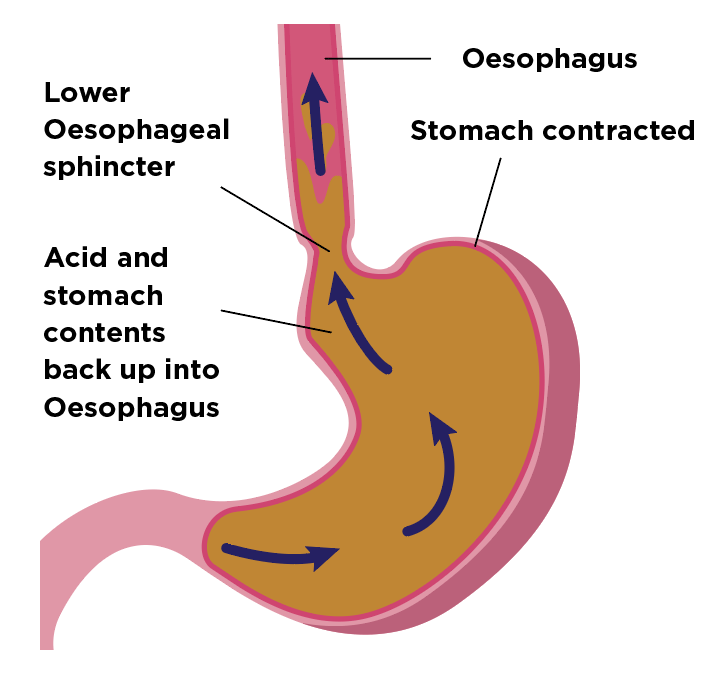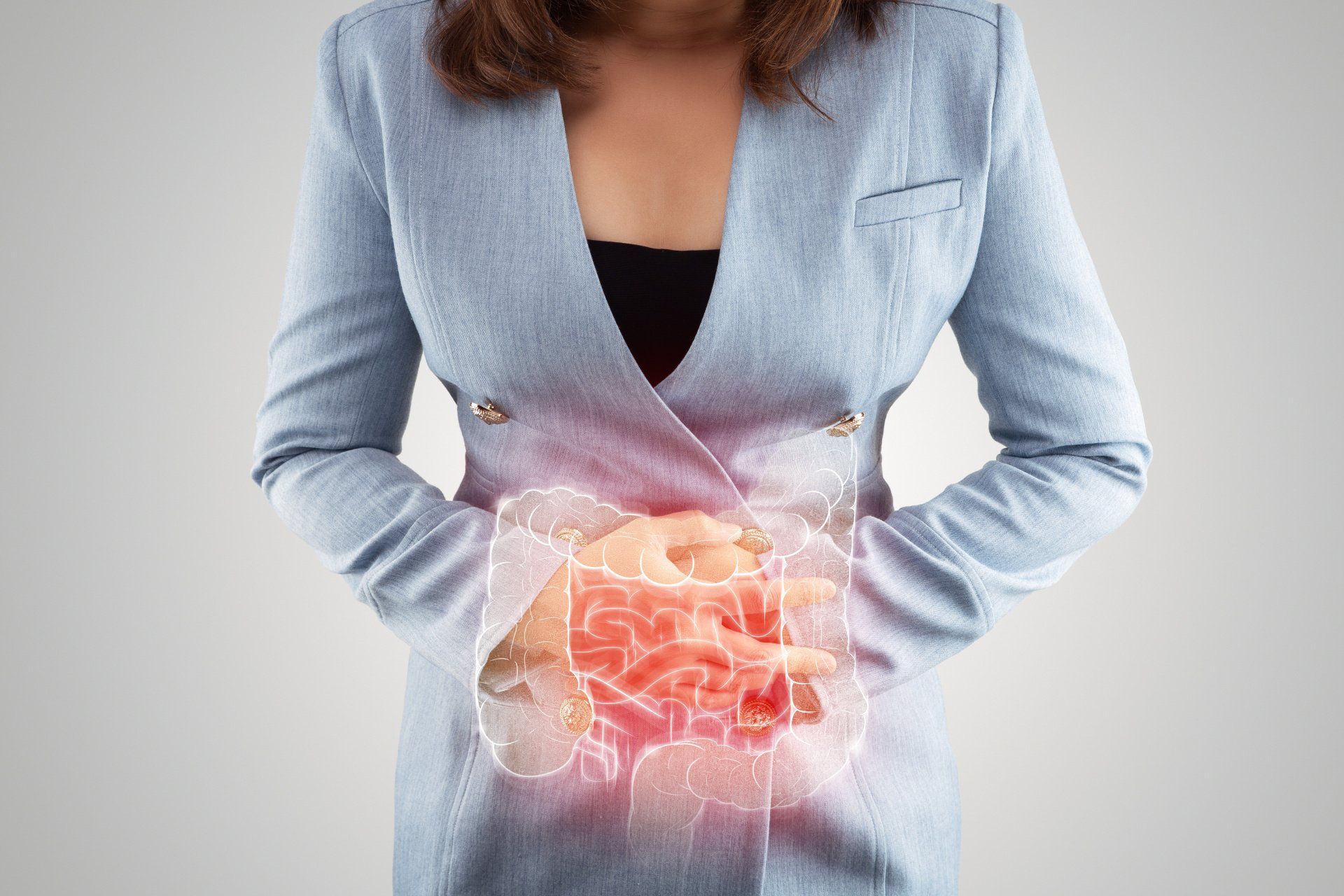Heartburn & Acid Reflux | What Are The Causes, Symptoms & Treatments?
Heartburn is extremely common and affects up to 1 in every 5 of UK adults. But what is it? Heartburn is when the stomach acid backs up into the tube that carries food from your mouth to your stomach (oesophagus).
Normally when you swallow, a band of muscle around the bottom of your oesophagus (lower oesophageal sphincter) relaxes to allow food and liquid to flow down into your stomach. Then the muscle tightens again.
If the lower oesophageal sphincter relaxes abnormally or weakens, stomach acid will flow back up into your oesophagus (acid reflux) and cause heartburn.
The acid backup may be worse when you're bent over or lying down.

What Causes Heartburn & Acid Reflux?
There are certain factors which appear to cause and worsen heartburn and reflux. These include:
- Smoking
- Drinking excess alcohol
- Certain food and drink ( coffee, tomatoes, chocolate and fatty or spicy foods)
- Pregnancy
- Stress and Anxiety
- Some medicines - such as anti-inflammatory painkillers (like ibuprofen)
- Bending forwards
- Excess body weight (obesity)
- A hiatus hernia – when part of your stomach moves up into your chest
However, many people can suffer from heartburn when there is no apparent lifestyle or other factor causing the problem. It is also quite common for people to develop symptoms because of reflux when there are no signs of oesophagitis. Doctors believe that in such cases the lining of the oesophagus is unusually sensitive to reflux of acid.
What Symptoms Are Associated With Heartburn & Acid Reflux?
For most people, heartburn and reflux is just a nuisance burning sensation in the chest and in the throat, and some notice discomfort or pain as they swallow causing them to frequently need to clear their throat, cough or they could start choking. It is quite common for these symptoms to be worse at night or when lying down.
In a few people, especially where there is severe inflammation of the oesophagus, there is a risk of complications. These can include internal bleeding and narrowing of the gullet, linking to conditions such as Barrett’s Oesophagus. This is a condition that can, very rarely, progress to cancer of the lower oesophagus. If you are worried about these complications, please discuss them with your GP as soon as you can.
When to see your GP:
- You have experienced heartburn most days for 3 weeks or more
- You are getting food stuck in your throat, frequently being sick or losing weight for no reason
- You have difficulty or pain when swallowing food
- You have heartburn, indigestion, hiccups or an unpleasant taste in your mouth for three weeks or more
How is Heartburn & Acid Reflux Diagnosed?
Your doctor will ask you to describe your symptoms and the length of time you have had them, to review the need for prescribing the right treatment/medication for you. Should you require such medication long term or the treatment is not working, and your symptoms continue or return, your GP may request an endoscopy. This will ensure there are no underlying problems with your oesophagus or stomach. Here is a quick breakdown of the different procedures your doctor may use to diagnose the problem at hand:
Endoscopy: This test involves passing a thin, flexible tube through the mouth or nose and down into the oesophagus, stomach and start of small intestine. It is usually carried out as an outpatient and takes less than 15 minutes. The endoscopist will take small tissue samples (biopsies) for analysis in the laboratory. The procedure is not painful, but it may be uncomfortable at times, so you may be offered a local anaesthetic throat spray and/or a sedative. Do not worry about knowing which to go for right away, the endoscopist will guide you in this decision.
Barium Meal: Is a procedure in which you drink barium liquid, which will show your oesophagus, stomach and first part of the small intestine on x-ray. It gives less information than an endoscopy but is good at identifying a hiatus hernia or oesophagus narrowing.
Cytosponge: This is a relatively new test that is available in some areas of the UK to identify Barrett’s oesophagus in people who have persistent heartburn and reflux symptoms. For the Cytosponge test, you swallow a small capsule with a sponge inside, which is attached to a piece of thread. After swallowing it, the capsule dissolves in the stomach, and the sponge inside is released. Then a nurse removes the sponge by pulling on the thread. On the way out of the body, the sponge collects cells from the oesophagus lining so that the laboratory can check if there are any changes in the cells to be noted.
What Treatments Are Available For Heartburn & Acid Reflux?
Most treatments revolve around lifestyle changes as your symptoms are likely to lessen if you take measures to reduce the amount of reflux that you have. The lifestyle changes you can make to treat the symptoms of and prevent heartburn and acid reflux occurring are:
- Stopping smoking
- Reducing alcohol
- Losing weight
- Reducing your intake of fizzy drinks
- Avoiding meals late at night (have your last meal at least 3 hours before you go bed)
- Limiting spicy foods
- Eating little and often instead of three big meals a day
- Propping your head up in bed to alleviate symptoms
There are also a variety of medicines you may be prescribed to help lessen acid reflux symptoms. These are:
Acid-supressing medications: capsules or tablets which reduce the amount of acid produced by the cells in your stomach.
Antacids: alkaline liquids or tablets that reduce the amount of acid produced in the stomach. They usually work immediately and are best taken after meals and before going to bed.
Alginates: these form a thick protective layer on top of the stomach contents and help reduce reflux symptoms. These can be useful to take after meals and before going to bed to reduce night-time symptoms.
Your doctor will discuss all the treatment options available to you once you have discussed your symptoms and whether you have had tests done to examine what is going on in your case.
Care at Chartwell Hospital
At Chartwell Gut Health, we have a team of specialists dedicated to providing the best possible care for all of our patients. We diagnose and treat common abdominal symptoms such as rectal bleeding, change in bowel habit and abdominal pain which can be distressing for patients. In most cases, the symptoms are due to underlying health problems. However, for more serious cases, early detection, diagnosis, and treatment is key to recovery.
Our specialists use comprehensive examinations and testing to diagnose various conditions. In addition to testing blood and stool samples, our Consultant Gastroenterologists may use other diagnostic tools including colonoscopy, gastroscopy, flexible sigmoidoscopy, MRI, X-rays, and CT scans.
To book a FREE consultation at Chartwell Gut Health, please complete our online form to arrange a suitable date and time for a FREE video consultation.









